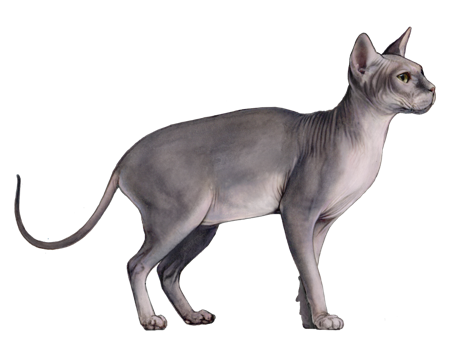
Highlander
Highlanders have a powerful, wild appearance. But they are gentle giants at heart. They love to be the center of attention and are excellent entertainers, playmates, and—like most cats—nappers.
Interested in discovering if your cat is a Highlander?
Check out Wisdom Panel's DNA test.
Highlander Traits
General Appearance
The Highlander is a medium-to-large cat with a muscular, powerful body. Most Highlanders have curled ears and a short bob-like tail, but some are born with straight ears, a long tail, or polydactyl feet (extra toes).
Coat and Colouring
Both longhaired and shorthaired Highlanders exist. And their coats come in various colors and patterns—including solid, tabby, mink, tortoiseshell, pointed, and smoke.
Distinctive Physical Traits
Highlanders' ears are among their most unique features. They stand tall and have a wide base, and—for many Highlanders—the top third of the ear has a loose backward curl. When this breed has a naturally short tail, it ranges in length from one to six inches. Highlanders also have a long, sloping forehead and medium-to-large eyes shaped like a flattened oval.
Highlander Temperament
Torn between getting a dog or a cat? Some say a Highlander is the best of both worlds. This intelligent breed can easily learn to fetch, walk on a leash, and sit. And don't be surprised if they meet you at the door with a toy in their mouth.
A very active, powerful breed, Highlanders like to run, play, and chase. They are patient and gentle with kids, who are often their preferred playmates. Cat trees and durable toys will help prevent these high-energy kitties from getting bored.
Highlanders have an affectionate nature and get along with everybody—including dogs and other pets. They love to be the center of attention and will clown around and perform tricks to entertain their humans.
Highlander History
The Highlander is a newer cat breed that traces its roots back to the Highland Lynx.
In 1993, east coast breeder Joe Childress wanted to develop a breed with a powerful "big cat" look and a domestic cat personality. So, he crossed two hybrid breeds—the Desert Lynx and the Jungle Curl—to create the Highland Lynx.
The Highland Lynx is currently registered with the Rare and Exotic Feline Registry but no major cat associations. As selective breeding continued, breeders changed the name to Highlander because "lynx" refers to wild cats or a description in markings.
In 2008, The International Cat Association recognized the Highlander for competition in the Preliminary New Breed class.
Highlander Care
Nutrition
Despite having ties to wild cats, Highlanders are a domestic breed with no special food requirements. A high-quality, commercially prepared diet will meet their nutritional needs. But because food needs vary for kittens, adults, and senior cats, opt for a formula that's age-appropriate for your pet.
To keep your cat at a healthy weight, monitor their food intake and reduce portions if they start to pack on the pounds. And don't forget to account for treats. As a guideline, treats should make up no more than 10% of a cat's calories.
In addition to regular meals, easy access to fresh, clean water is important to every cat's health.
Grooming
To remove dirt and loose fur, shorthaired Highlanders should be brushed once a week, longhaired Highlanders up to three times a week. It's also wise to trim your cat's nails monthly to prevent them from digging into their paw pads. Plus, nails that get too long are more likely to snag on something and become torn or damaged.
Highlanders' ears tend to get wax buildup and thus require regular cleaning. Finally, you should routinely brush your cat's teeth at home and schedule the occasional professional dental cleaning and exam with your veterinarian.
Health
Roughly one out of every three cats in the United States is overweight or obese. And those extra pounds can contribute to other health risks—such as arthritis, diabetes, and heart problems. Your veterinarian is the best resource for tips on keeping your cat at a healthy weight.
Breed Group
Western
The largest of breed groups, the Western Group is mainly comprised of cats developed in Europe and the Americas. Due to the complexity of feline genetic diversity, however, cat breeds from other regions may also be found associated with this group.
Resources
https://tica.org/highlander-breeders?view=article&id=890:highlander-breed&catid=79
https://www.catster.com/cat-breeds/highlander
https://www.petguide.com/breeds/cat/highlander/
https://www.catownerclub.com/breeds/profiles/highlander-cat/
https://www.trulyyourshighlanders.com/about-highlander-breed-and-qa.html
https://www.banfield.com/state-of-pet-health/obesity
Reviewed 23 February 2021 by Annette Louviere, DVM




































